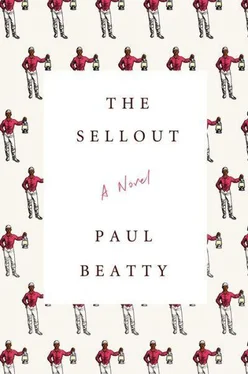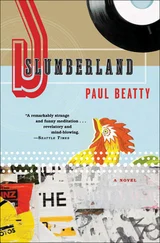“How satisfied were you with your act of selflessness?”
Not at all Somewhat satisfied Very satisfied
1 2 3 4 5
On the way home, Pops put a consoling arm around my aching shoulders and delivered an apologetic lecture about his failure to take into account the “bandwagon effect.”
Then there was the time he wanted to test “Servility and Obedience in the Hip-hop Generation.” I must’ve been about ten when my father sat me down in front of a mirror, pulled a Ronald Reagan Halloween mask over his head, pinned a defunct pair of Trans World Airlines captain wings to his lab coat, and proclaimed himself a “white authority figure.” “The nigger in the mirror is a stupid nigger,” he explained to me in that screechy, cloying “white voice” comedians of color use, while attaching a set of electrodes to my temples. The wires led to a sinister-looking console filled with buttons, dials, and old-fashioned voltage gauges.
“You will ask the boy in the mirror a series of questions about his supposed nigger history from the sheet on the table. If he gets the question wrong or fails to answer in ten seconds, you will press the red button, delivering an electric shock that will increase in intensity with each wrong answer.”
I knew better than to beg for mercy, for mercy would be a rant about getting what I deserved for reading the one comic book I ever owned. Batman #203, Spectacular Secrets of the Batcave Revealed , a moldy, dog-eared back issue someone had thrown into the farmyard and I brought inside and nursed back to readability like a wounded piece of literature. It was the first thing I had ever read from the outside world, and when I whipped it out during a break in my homeschooling, my father confiscated it. From then on, whenever I didn’t know something or had a bad day in the neighborhood, he’d wave the comic’s half-torn cover in my face. “See, if you weren’t wasting your life reading this bullshit, you’d realize Batman ain’t coming to save your ass or your people!”
I read the first question.
“Prior to declaring independence in 1957, the West African nation of Ghana was comprised of what two colonies?”
I didn’t know the answer. I cocked my ears for the roar of the rocket-propelled Batmobile screeching around the corner, but could only hear my father’s stopwatch ticking down the seconds. I gritted my teeth, placed my finger over the red button, and waited for the time limit to expire.
“The answer is Togoland and the Gold Coast.”
Obediently, as my father predicted, I pressed the button. The needles on the dial and my spine both straightened, while I watched myself in the mirror jitterbug violently for a second or two.
Jesus.
“How many volts was that?” I asked, my hands shaking uncontrollably.
“The subject will ask only the questions that are listed on the sheet,” my dad said coldly, reaching past me to turn a black dial a few clicks to the right, so that the indicator now rested on XXX. “Now, please read the next question.”
I began to suffer from a blurring of vision I suspected was psychosomatic, but nonetheless everything was as out of focus as a five-dollar bootleg video on a swap-meet flat screen, and to read the next question I had to hold the quivering paper to my nose.
“Of the 23,000 eighth-grade students who took the entrance exam for admission into Stuyvesant High, New York’s most elite public high school, how many African-Americans scored high enough to qualify for admission?”
When I finished reading, my nose began to bleed, red droplets of blood trickling from my left nostril and plopping onto the table in perfect one-second intervals. Eschewing his stopwatch, my father started the countdown. I glanced suspiciously at him. The question was too topical. Obviously he’d been reading The New York Times at breakfast. Prepping for the day’s experiment by looking for racial fodder over a bowl of Rice Krispies. Flipping from page to page with a speed and rage that caused the paper’s sharp corners to snap, crackle, and pop in the morning air.
What would Batman do if he rushed into the kitchen right then and saw a father electrocuting his son for the good of science? Why, he’d open up his utility belt and bust out some of those tear-gas pellets, and while my dad was choking on the fumes, he’d finish asphyxiating him, assuming there was enough bat rope to tie around his fat-ass hot-dog neck; then he’d burn out his eyeballs with the laser torch, use the miniature camera to take some pictures for bat-posterity, then steal Pop’s classic, only-driven-on-trips-to-white-neighborhoods sky-blue Karmann Ghia convertible with the skeleton keys, and we’d bone the fuck out. That’s what Batman would’ve done. But me, cowardly batfag that I was and still am, I could only think to question the question’s shoddy methodology. For instance, how many black students had taken the admissions test? What was the average class size at this Stuyvesant High?
But this time, before the tenth drop of blood had landed on the table, and before my father could blurt out the answer (seven), I pressed the red button, self-administering a nerve-shattering, growth-stunting electric shock of a voltage that would’ve frightened Thor and lobotomized an already sedated educated class, because now I, too, was curious. I wanted to see what happens when you bequeath a ten-year-old black boy to science.
What I discovered was that the phrase “evacuate one’s bowels” is a misnomer, because the opposite was true, my bowels evacuated me. It was a feces retreat comparable to the great evacuations of history. Dunkirk. Saigon. New Orleans. But unlike the Brits, the Vietnamese capitalists, and flooded-out residents of the Ninth Ward, the occupants of my intestinal tract had nowhere to go. What runny parts of that fetid tidal wave of shit and urine that didn’t encamp itself about my buttocks and balls ran down my legs and pooled in and around my sneakers. Not wanting to hinder the integrity of his experiment, my father simply pinched his nose shut and motioned for me to proceed. Thank goodness, I knew the answer to the third question, “How many Chambers are in the Wu-Tang?” because if I hadn’t, my brain would be the ash-gray color and consistency of a barbecue briquette on the Fifth of July.
My crash course in childhood development ended two years later, when Dad tried to replicate Drs. Kenneth and Mamie Clark’s study of color consciousness in black children using white and black dolls. My father’s version, of course, was a little more revolutionary. A tad more modern. While the Clarks sat two cherubic, life-sized, saddle-shoe-shod dolls, one white and one colored, in front of schoolchildren and asked them to choose the one they preferred, my father placed two elaborate dollscapes in front of me and asked me, “With whom, with what social-cultural subtext are you down with, son?”
Dollscape I featured Ken and Malibu Barbie dressed in matching bathing suits, appropriately snorkeled and goggled, cooling by the Dream House pool. In Dollscape II, Martin Luther King, Jr., Malcolm X, Harriet Tubman, and a brown-skinned, egg-shaped Weeble toy were running (and wobbling) through a swampy thicket from a pack of plastic German shepherds leading an armed lynch party comprised of my G.I. Joes hooded in Ku Klux Klan sheets. “What’s that?” I asked, pointing to a small white Christmas ornament that spun slowly over the bog, glittering and sparkling like a disco ball in the afternoon sun.
“That’s the North Star. They’re running toward the North Star. Toward freedom.”
I picked up Martin, Malcolm, and Harriet, teasing my dad by asking, “What are these, inaction figures?” Martin Luther King, Jr., looked okay. Stylishly dressed in a glossy black tight-fitting suit, a copy of Gandhi’s autobiography glued to one hand and a microphone in the other. Malcolm was similarly outfitted, but was bespectacled and holding a burning Molotov cocktail that was slowly melting his hand. The smiling, racially ambiguous Weeble, which looked suspiciously like a boyhood version of my father, stayed true to its advertising slogan by wobbling and never falling down, whether balanced precariously in the palm of my hand or chased by the knights of white supremacy. There was something wrong with Ms. Tubman, though. She was outfitted in a form-fitting burlap sack, and I don’t remember any of my history primers describing the woman known as Moses as being statuesque with a 36–24–36 hourglass figure, long silky hair, plucked eyebrows, blue eyes, dick-sucking lips, and pointy titties.
Читать дальше












